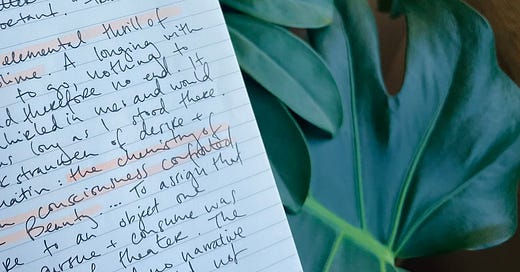I started a commonplace book a few weeks ago.
I hadn’t heard of this very old practice until stumbling on a post about it recently, but commonplace books are meant to be a catalog of ideas and knowledge. You record choice quotes, poems, facts, or concepts—whatever you like—in a notebook and organize everything by theme. Virginia Woolf kept a commonplace book. So did Samuel Taylor Coleridge and W.H. Auden and a bunch of other folks.
I loved the concept immediately. I have far too many books lying around my house with dog-eared pages and exclamation points in the margins, but I’ve had no way of collating it all, even though so much of it points toward a shared something. With a commonplace book, all those dog-eared pages and exclamation points can coexist on the same page. All these different writers can be read in conversation.
It’s simple (unless you want to follow John Locke’s overly-involved system for keeping one): any time you’re inspired to jot something down, you consider its theme. Throughout the notebook, you title pages with these themes, adding new ones as you go. Gradually, you build an index at the front of the notebook with page-number references. It ends up being a primary catalog of your obsessions.
I love obsessions. I am obsessed with obsessions. I want to know everyone’s obsessions.
So far, my index includes:
Beauty
Love
Sex
Death
The Family
Writing
Desire
Want Me
“Nature”
Shame
Masculinity
Then there’s a whole Spirituality section, with more sub-topics than I will actually share because I’m still kind of stupidly bashful about this area of interest:
Tao
Zen
Presence
Absence/Emptiness
Mystery
Wisdom/Enlightenment
Time
Universe
Misc. Spirituality.
I would appreciate having an index of my obsessions at any time, but right now it feels like a lifeline. A sign of life. In the midst of so much cruelty and hatred—so much anti-intellectualism—that index feels like a reminder of those things I want to hold onto: passion, curiosity, inspiration, and connection.
I want to sit with all my books. I want to collect all the world’s beauty and wisdom. On a less virtuous tip, a commonplace book is a perfect hobby to take up as you’re trying to finish edits on a book. Yes, yes, I’ll get to that re-write, but first lemme just try to get a handle on the concept of non-being real quick.
I figure you probably don’t need another hot take right now, but maybe you could use a reminder of your passions or a distraction technique (if so,
has an in-depth primer on keeping a commonplace book).I leave you with a few things I jotted down this week.
Presence
“To be sensual, I think, is to respect and rejoice in the force of life, of life itself, and to be present in all that one does from the effort of loving to the breaking of bread.”
—James Baldwin in The Fire Next Time
Desire
“If women begin to seek the language of their own desire [it] would be a force capable of demolishing the structures of the family and society.”
—I scribbled this down without attribution and can’t find a source, but it’s too good not to include
Time
“Think about the biggest trauma of all, the one called Universe, otherwise known as the Big Bang. Everything around you, your hands, the door, the smell of dust after rain, is the current state of that explosion. Everything around you right now is, among other things, the wavefront of the Big Bang.”
—Timothy Morton in “On Ecotrauma”
Want Me
“Sometimes I counted the men of my past like rosary beads. He loved me. He wanted to sleep with me. Even just, he looked at me. Even just, I came into being, for a moment, because I was visible to him. It was as if I’d won by making these men want me. But what game? For what prize?”
—Leslie Jamison in Splinters
Masculinity
“The massive contradiction between the public exhortation to aggressive individualism, and a reality where most white-collar workers are unavoidably cogs in the economic machine, is neatly resolved by displacing the scene of action into a mystic cult of masculinity. We can’t all be Donald Trump, but, by God, we can be equally fierce in our hearts.”
—Bob Connell in “Men at Bay,” a wildly prescient essay published in 1995
Writing
“What if I think of success as connection? Relationships. Togetherness. The moment in which I speak a truth and you hear that truth and recognize it within yourself, recognize me within yourself. … It doesn’t seem like the purpose was to have a career or gain followers. It seems like all of these forces made it possible for me to find you. As you are right now. Where you are right now. And for you to find me. Because I think we might need one another.”
—Carvell Wallace in Another Word for Love
Beauty
“Just the elemental thrill of the sublime. A longing with nowhere to go, nothing to feed, and therefore no end. It just whirled in me and would for as long as I stood there. A Moskstraumen of desire and appreciation: the chemistry of human consciousness confronted with Beauty.”
—Melissa Febos in her forthcoming The Dry Season
Absence/Emptiness
“I now realize that the only thing that can justify scientific and philosophical endeavor, and art, is not knowing what nothingness is. And if the shadow of nothingness, in one form or another, does not hover over writing, even of a kind most acquiescent to the beauty of the world, it doesn't really contain anything of use to the living.”
—Annie Ernaux in The Uses of Photography





Thanks for these quotes, Tracy. I have a notebook like this. Not quite a journal nor a book of lists. I now have a name for it!
The nerd in me sees the nerd in you. I want to make one of these books so bad!